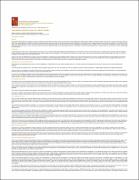| dc.contributor.author | Paganini, Agostino | |
| dc.date.accessioned | 2019-02-14T13:47:36Z | |
| dc.date.available | 2019-02-14T13:47:36Z | |
| dc.date.issued | 2004-04 | |
| dc.identifier.issn | 2073-0683 | |
| dc.identifier.uri | http://hdl.handle.net/20.500.12280/1383 | |
| dc.description.abstract | The Bamako Initiative (BI) was a pragmatic strategy to implement primary health care (PHC) in the era of economic structural adjustment. Championed by UNICEF’s charismatic leader, James Grant, it sought to fill the gap created by WHO’s open-ended approach to health for all and a hard-nosed economic reform pursued by the World Bank and International Monetary Fund. Economic reforms virtually destroyed social services and safety nets. The idea of BI was to select a few critical elements of PHC for child survival, which would be funded partly through community contributions. These contributions were expected to be in addition to donor and Government expenditure. But this approach was
rejected by public health experts. And in the end the initiative did not make a significant impact on the deteriorating conditions of child welfare. Therefore it was abandoned. But it sowed the seeds for communities to seek for accountability for social services. | en_US |
| dc.language.iso | en | en_US |
| dc.publisher | Uganda Martyrs University, Department of Health Sciences | en_US |
| dc.rights | Attribution-NonCommercial-NoDerivs 3.0 United States | * |
| dc.rights.uri | http://creativecommons.org/licenses/by-nc-nd/3.0/us/ | * |
| dc.subject | Bamako Initiative (BI) | en_US |
| dc.subject | Primary Health Care (PHC) | en_US |
| dc.subject | Economic Structural Adjustment | en_US |
| dc.title | The Bamako Initiative Was Not About Money | en_US |
| dc.type | Article | en_US |



